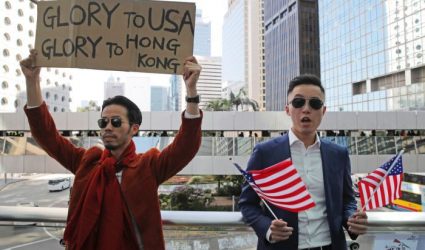Trump says new US law on Hong Kong doesn’t help China trade talks

(CNA) – U.S. President Donald Trump said on Monday U.S. legislation backing protesters in Hong Kong did not make trade negotiations with China easier, but added he believes Beijing still wants a deal with the United States.
The law “doesn’t make it better, but we’ll see what happens,” Trump said, talking to reporters. He gave no indication when the deal would be finalized, but two other U.S. officials said a deal could still happen this year depending on China’s actions.
Washington and Beijing have yet to ink a so-called “phase one” trade agreement announced in October, which had raised hopes of a de-escalation in their prolonged trade war. The global economy has shuddered with each salvo of tariff hikes by the world’s two largest economies.
“The Chinese are always negotiating. I’m very happy where we are,” Trump said as he prepared to depart the White House for a NATO summit in London. “The Chinese want to make a deal. We’ll see what happens.”
Chinese President Xi Jinping said last month he wants to work out a trade deal with Washington, but broader bilateral tensions have flared amid U.S. legislative action supporting Hong Kong’s protesters, and targeting camps for Uighur ethnic minorities in the western region of Xinjiang.
Trump last week signed a new law backing protesters in Hong Kong and threatened China with possible sanctions on human rights. Beijing in response barred U.S. military vessels and aircraft from visiting Hong Kong and sanctioned several U.S. non-government organizations. News site Axios also reported on Sunday the Hong Kong law stalled the trade deal.
Global Times, an influential tabloid published by the official People’s Daily newspaper of China’s ruling Communist Party, tweeted Tuesday that Beijing will soon release its so-called unreliable entities list imposing sanctions against those who harm China’s interests.
The paper said China is expediting the process for the list because the U.S. House is expected to pass a bill on Xinjiang that will “harm Chinese firms’ interests”, and that “relevant” U.S. entities will be part of Beijing’s list.
The U.S. Senate in September passed the Uyghur Human Rights Policy Act of 2019, a bill that calls on China to end what it calls “arbitrary detention, torture, and harassment” of Uighurs and other ethnic Muslim minorities. The bill is being considered by the U.S. House of Representatives.
Global Times editor-in-chief Hu Xijin also tweeted separately on Tuesday that China could ban all U.S. diplomatic passport holders from visiting Xinjiang and may also impose visa restrictions against U.S. lawmakers and officials with “odious performance” on Xinjiang. He did not say how he obtained this information.
When asked to comment on the claim, Chinese Foreign Ministry spokeswoman Hua Chunying repeated comments she made on Monday that China will implement further measures according to how the situation develops.
“The determination of China’s government to oppose foreign forces interfering in China’s internal affairs is firm and unshakable,” said Hua, speaking at a news briefing in Beijing on Tuesday.
The U.S. embassy in Beijing declined to comment on the reports of possible Chinese government action.

